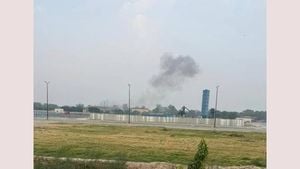On January 27, 2024, the city of St. Petersburg commemorated the 81st anniversary of the lifting of the siege of Leningrad, marking one of the most significant events in the city’s and Russia's history. Exactly 81 years ago, on January 27, 1944, the long and harrowing 872 days of blockade by Nazi forces finally came to an end. Current residents and many veterans gathered to pay homage to the memory of those who suffered and fought during this brutal period of World War II.
The circumstances surrounding the siege are etched deeply within the collective memory of the people. On this day, citizens and dignitaries gathered at the Palace of Culture 'Yunost' to honor the valor and resolve of the countless individuals who lived through this dark chapter. Among those present was Alexey Gerasimov, the head of the city, who stated during his address, "This year our country will celebrate the 80th anniversary of the victory in the Great Patriotic War, and today, January 27, marks 81 years since the complete liberation of Leningrad from the fascist blockade." His words echoed the sentiments shared by many as they reflected on the legacy of endurance exhibited by Leningraders.
The siege began on September 8, 1941, when the city was cut off from supplies and resources, leading to dire food shortages and devastating humanitarian crises. Reports estimate the loss of life during this agonizing period reached up to 1 million people, primarily due to starvation and warfare. Yet, even amid the hopelessness, the spirit of the people shone through as factories continued to operate, and cultural life persisted.
Veterans like Vladimir Lyamin and other participants from different backgrounds recounted their experiences and shared stories about their relatives, emphasizing the importance of remembrance. Sergey Geraskin, who spoke at the event, shared, "One of my relatives worked in besieged Leningrad on the railway called the 'Corridor of Death'. It was built within two weeks." His narrative underlines the immense human effort required to maintain some semblance of supply during the blockade.
The observance wasn't only about remembering the past. It was also about engaging the younger generation to instill knowledge of history. Valentina Gostiсheva, who is part of the association of former child inmates of the concentration camps, shared her thoughts: "We, former inmates of ghettos and concentration camps, continue to carry out educational work. We strive for children to understand what war is and how to defend our peace by any means necessary." Through such efforts, speakers aimed not just to relay experiences but motivate the youth to appreciate and protect the peace and freedom fought for by their predecessors.
Performances by local artists added rich cultural depth to the memorial, engaging the audience emotionally and weaving the past with contemporary expressions of resilience and tribute. Young students listened intently, absorbing the poignant lessons delivered by those who experienced war directly. The ambiance was somber yet filled with collective pride as the recounting of events brought together memories of pain and survival.
These memorials hold significant importance, reminding the living of the sacrifices endured and the lessons learned. The story of the Leningrad blockade is not just one of tragedy but of survival against overwhelming odds. The spirit of resilience, the refusal to yield in the face of unimaginable hardship, continues to serve as powerful testimony to strength and human endurance.
Such annual commemorations play a pivotal role as they encourage discussions about peace, bravery, and the enduring legacy of the past. It’s imperative for every generation to encounter stories such as those of the siege of Leningrad. Historical events must not be forgotten; they need to be actively remembered and shared, so they resonate through time, nurturing future generations.
January 27 stands not only as a day to honor those who endured the ravages of war, but also as a reminder of the power of unity, the importance of history, and the necessity of commemorative acts. Events like the one at the Palace of Culture 'Yunost' serve as binding threads among communities, compelling all to learn from the past and strive for peace today.



